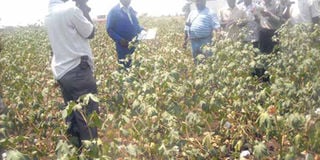GM crops or not? Farmers undecided as the debate on biotech bill heats up

MPs and other stakeholders at a Bt cotton field trial in Kasese. Cotton is one of the crops in which biotechnology mechanisms have been used to deal with the problem of pests. Photo by Lominda Afedraru
What you need to know:
In the face of most local varieties losing their productivity and a number facing extinction, the appeal of better performing GMOs is obvious. But concerns and controversy is making the choice uncertain for the farmers.
As the public debate continues about the Biotechnology and Biosafety Bill, which is before Parliament, representatives of farmers’ groups are in dilemma over which option to take.
Some see adopting improved varieties over the traditional ones as a better choice, while others are uncomfortable with the idea of adding a clause on labelling genetically modified crops as it will drive consumers from purchasing their products.
Some experts feel the bill needs to be passed into law but admit the draft bill needs to be improved upon because it has loopholes.
Genes and patents
Dr Chris Bakuneeta of Makerere University, while presenting a paper, “What are GMOs?” to members of Southern Africa Small Scale Farmers’ Forum-Uganda (ESAFF), said, “There is no problem for scientists to improve crops, animal and poultry using biotechnology but the challenge is, is it going to have negative effects on human health or not?”
He added if the bill is to contain that component of GMOs, then it should be owned solely by Ugandans including the farmers. This is because multinational companies want to control the patents of these products by owning them.
“These companies are free to give us genes to improve our crops but should not say Uganda’s cassava, banana, sweet potatoes, maize and rice varieties belong to them by patenting it for the farmers to keep buying the seeds,” he asserted.
But Ms Eleanor Kambuga, a Luweero-based farmer, said convincing farmers not to grow improved varieties is a waste of time because it is becoming difficult to access seeds of local varieties as their yield is very low.
“These discussions are good but traditional seeds are no longer seen in the market especially for maize, rice and ground nuts. Others may be vegetatively propagated crops like banana and coffee where propagation is done using traditional methods,” she observed.
Farmers are interested in income generation to improve their livelihoods and so if the improved crops are high yielding, it will be hard not to grow them. But she has a problem with labelling GMO products saying it will drive away consumers from purchasing these products and the farmer will be the loser.
Royalty-free
Dr Giregon Olupot, also from Makerere University, said the bill lacks a number of factors in favour of the farmer. A case in point is the penalties described in some clauses, which he described as minimal to those involved in the GM product development.
The regional coordinator for the Bio-safety System programme in Uganda, Dr Thereza Sengoba said Monsanto, a company engaged in producing and providing a number of genes for scientists to improve these crops, is interested in important global crops like soy bean, cotton and maize among others.
“Everyone is aware of the high yield potential of GMOs and returns in terms of income. In the case of Uganda where research work is going on in cotton and maize where Monsanto has interest, there is an agreement to get these genes royalty-free meaning after release, farmers will be able to acquire the seeds at the usual price like any other seed purchased as public good,” she explained.
Sengoba added though Monsanto has interests in GMOs, it is also interested in the traditional staples consumed in Uganda, so the company will not override the national interest. On the penalties, she agreed it has to be discussed and reviewed for a consensus.
As the debate on the biotechnology and biosafety continues, opinion remains divided into for and against. For the farmers, it is likely to remain a dilemma of choice of which is better suited to meet their needs.




